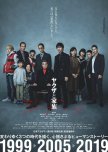
This review may contain spoilers
classic and romantic, realistic and tragic
With a recurring sight of an industrial chimney amidst a coastal town, Michihito Fujii's movie about yakuza and family, aired first in 2020 in Taipei, offers us a nice view on Japanese society: both romanticized and realistic, with not-so-good characters but good technique.Starting concretely after an introductory first time period of more than 20 minutes of screen time (!), the movie offers a quite amusing, if not weird contrast for depicting yakuza. While they are pretty much shown as heroes in the second time period of the movie, carefree and admired by the population, they become total outcasts in the third time period. This evolution from a romanticized view to a realistic one feels a bit too astounding: I'd guess that Fujii wanted first to show the classic romantic view on yakuza in said second period to enter into the usual trope of the genre, before moving on to the newer realistic approach of its third phase — an understandable choice, that could have been more well performed nonetheless.
That being said, it is really for that third period that the movie shines. Recently, due to a series of laws passed in the 2010s, the yakuza world has been waning in Japan. Despite this, the world of art and entertainment still prefers to continue showing us badass and cool yakuzas. The view captured here by Fujii is not only realistic: it is also real at all. Today, being a yakuza is not fun, nor enjoyable, nor even a concretely possible life to lead: as one would stop being one, one would face strong ostracism for a rough 5 years, to the extent of losing one's friends, peers and even family, while struggling for even getting a cellphone. The Japanese society, highly cohesive, doesn't play around when it comes to dealing with outcasts. For that point, I found that the movie used very neatly the fact it was changing time periods: thus for the last one in 2019 that showcased the appearance of social networks and their astounding speed and strength for spreading quickly a small piece of information like a picture.
For that matter, the movie also shows some other interesting societal aspects. The most obvious is how the police is corrupted to the core and tied with the yakuza and their affairs: it's not by chance that the yakuza were so deeply rooted in Japanese society before. More interestingly, the movie asks the real question of how to deal with former criminals after they have served their prison sentence and their reintegration into society.
As its title shows by mentioning the word twice in Japanese and in English, the movie especially insists on the theme of family: its main character hasn't gotten the opportunity to grow within one, and has been longing for it — even if that were to be yakuzas, even if it would mean losing them quickly. As such, the movie shows that one can long for loved ones, be them related by blood or not, and that at all costs.
Sadly, Fujii's characters aren't so well written, nor is their development. Because of this, we don't clearly understand how Yuka fell in love with Kenji, nor how far Shibasaki played a father figure for Kenji. This lack of character development is a pity, because it would have elevated the movie a lot. Next to that though, Fujii tells his narration through clues and not just simple lines of text (like for Kenji's dad's fate), which is quite pleasant.
Otherwise, the movie uses interesting techniques throughout, most notably for the camera and the image. The camera's motion differs depending on the scene: it can as much shake (maybe too much though), reflecting Kenji's mind wandering, or being steady when it wants to engraves a scene. There was a very nice scene where the camera, literally a passenger in a car, was accompanying the viewer all along. As for the image, its overall aspect changes depending on the period, gradually becoming forlorn, darker in color and light as we move further in time.
Despite its flaws, I personally loved this movie, and would recommend it for its portrayal both romantic and realistic of yakuza, and of Japanese society as a whole. If it can fail to grasp the viewer's interest in its first segment, the tragical turn it takes in the second segment is striking and definitely worth watching.
Was this review helpful to you?

This review may contain spoilers
The axe ought to be sharpened
Take a fairy tale, turn it into a novel and then into a movie: here you have the recipe for Takahashi Miike (崇史 三池)'s movie 『怪物の木こり』. Adapted from Mayusuke Kurai (眉介 倉井)'s novel of the same name, and englishly renamed 『Lumberjack the Monster』 for English audiences and beyond, this movie aired first in October 2023 tells the story of a serial-killer who follows the path of a fairy tale character. Through a thrilling story, the movies takes you to a travel where you'll remember what it means to feels something, though with a handful of poor handling here and there.Let's begin with the story. It is in itself pretty cool, albeit a bit too over-the-top. You have several children who were kidnapped and underwent surgery for implanting them neurochips… and one day someone decided to kill them all, because all of those children became psychopaths following their operation.
ngl, i was surprised by who was the real serial-killer, although there were too many hints given as the end was getting closer. But the real surprise was the end of the movie, which is imo the best part of the movie, as it makes you ponder on the idea of redeeming and the costs of your actions.
On the contrary of that end, the characters feel a bit cliché, or should i say stereotypical: the protagonist who is lacking emotions and ends up retrieving them, the big brain forensic, the old-timer, the gentle villain motivated by a superior goal… all common tropes in Japanese works. Also common is that only the MC and the villain evolve, which makes the other characters lack depth. It also doesn't help that some actors don't play so well: but to be fair, as a review made by The Arts Fuse magazine puts it, « what can you do with a role and a story this clichéd? ».
In addition of the characters and their actors, the dialogs feel somewhat dull. As much as they don't feel "artificial" per se, they do strongly feel fictional: like, you wouldn't hear that IRL. I'm thinking here especially to one of the last scenes where Akira and Takeshi speak together, and they begin to philosophize about emotions and life: this is such a Japanese way of handling dialogs, so dramatical, but so unrealistic (especially when not done correctly)!
That being said, I have to admit that this kind of philosophical pondering makes in itself the work more interesting, as it gives it a supplementary literary value and elevates the work beyond itself, so to speak.
Continuing with meh aspects, the pacing isn't great. Those aforementioned dialogs are often too long, whereas the scenes between each of the dialog are too short. It all makes more sense considering the movie is an adaptation of a novel: you really feel that this novel — or at least that adaptation — put emphasis on its dialogs more than the scenes between them. But here it feels just like one jumps from a dialog to another. And considering that most of the time the camera doesn't move a lot and/or uses uninteresting angles, the scenes sorely lack dynamic.
Also about the scenes, the setting and scenery aren't so innovative. Unrelated parts of a city and an old abandoned mansion of horrors: those two hardly feel connected, and as much as it's understandable from the point of view of the story, they could have created decorations that'd convey a connection better, and also that have more personality. It works enough, not gonna lie; but in addition of the aforementioned other bland parts, it doesn't help.
What wasn't bland was the gore: my gosh, Miike really likes his flows of blood! even if they are REALLY exaggerated lmao; but they weren't so frequent, so that it gives an interesting startling touch when they appear.
All in all, 『怪物の木こり』 is not bad, and its story and the philosophy at the end make it worth watching; but the various lacking elements pull down the overall quality.
It's my first movie from Miike, who i heard is well-known for his handling of the horror genre; i'll try to look into that part of his filmography next.
Was this review helpful to you?



